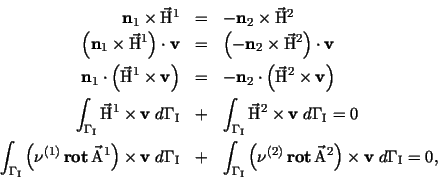|
Interface conditionsLet us assume that there are different material coefficients (e.g., for iron and air) in
and we find (classical) solutions of (6), implies the ''strong'' first interface condition On the other hand, it follows from that 
and the line integrals over the interface will cancel out, i.e., the second interface condition is contained in a ''weak'' sense in the variational formulation. Thus, the variational formulation presented in the following is the correct representation of the physical behaviour. We remark that the variational formulation can be derived from the energy functional of the magnetic field, too, and that the second interface condition is not included so naturally if a |
|